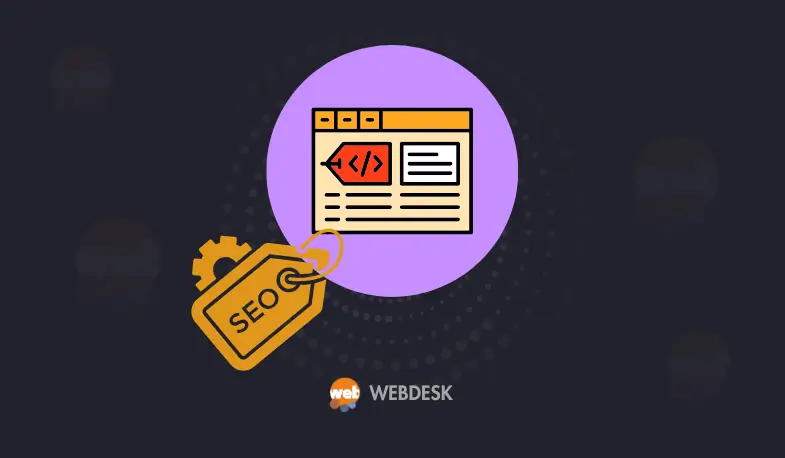Business and Finance, Web Design, WordPress
Your Guide to Using Meta Tags for Better SEO
Meta tags play a crucial role in enhancing your website’s SEO by helping search engines understand your content. By optimizing meta tags like titles, descriptions, and keywords, you can improve your site’s visibility and attract more organic traffic.
Did you know that nearly 70% of online searches start with a simple question? Meta tags are key to how your site shows up in search results. As we head into 2024, knowing how to use meta tags for SEO is more crucial than ever. These HTML tags are important for on-page SEO, giving search engines clues about your site’s content.
Even though users can’t see them, meta tags help your site get noticed more. In this guide, we’ll cover the basics of these technical SEO tools. We’ll also look at different types of meta tags and share tips to boost your online presence.
Unlock the Power of Meta Tags for Improved SEO Performance
What Are Meta Tags and Their Importance in SEO?
Meta tags are key parts of web pages, giving search engines important info about the content. They help explain what the page is about and how it should be ranked. Knowing about different meta tags can boost a page’s search engine ranking and make it more engaging for users.
Definition of Meta Tags
Meta tags are pieces of HTML code in a webpage’s header. They give metadata about the page. For example, the element can tell about the page’s description and how search engines should treat it. This helps search engines understand and organize the content better.
How Meta Tags Impact SEO
The SEO impact of meta tags is huge. Good meta tags make a page more visible in search results. This can lead to more visitors and sales. When people see interesting titles and descriptions, they’re more likely to click, which helps the page rank better.
Common Types of Meta Tags
There are several important types of meta tags that web developers should know:
- Title Tags: Show the webpage’s title and are key for search results.
- Meta Descriptions: Briefly describe the page’s content and appear in search results.
- Meta Keywords: Used to highlight keywords, but their role has lessened.
- Robots Meta Tags: Tell search engines how to handle links on a page.
Using these meta tags well helps websites work better with search engines. This is crucial for better online visibility.
The Different Types of Meta Tags Explained
Understanding various meta tags is key for a website’s search engine performance. Each meta tag has its own role in how content is indexed and shown. We’ll look at the main meta tags, like title tags, meta descriptions, meta keywords, and robot meta tags.
Title Tags
Title tags are crucial for SEO. They summarize a webpage’s content and show up in search results. They should be under 60 characters to avoid being cut off. Place primary keywords at the start for better ranking.
Having unique title tags for each page makes your site more relevant and user-friendly.
Meta Descriptions
Meta descriptions give a brief overview of a webpage’s content. They don’t directly affect rankings but can boost click-through rates. It’s important to write unique and engaging descriptions for each page, within 130-156 characters.
Adding primary keywords naturally can help your page show up more in searches.
Meta Keywords
Meta keywords are are used to tell search engines what a webpage is about. But Google and other search engines don’t pay much attention to them anymore. Including them is not necessary for today’s SEO.
Robots Meta Tags
Robots meta tags tell search engines how to handle pages and links. They can say whether a page should be indexed or not. They also guide on link behavior. Using these tags correctly is part of a good SEO strategy.
Crafting Effective Title Tags for SEO
Title tags are key in SEO, affecting search rankings and user interest. They need careful planning, the right keywords, and titles that grab attention. By following these tips, your title tags can boost your site’s performance in search results.
Best Practices for Title Length
Keeping title tags short is crucial for showing up in search results. Studies show that titles under 60 characters get more visibility. Titles longer than this might get cut off by Google, making them less effective. Aim for titles that shortort, yet still capture the page’s main idea.
Using Keywords Wisely
Putting keywords at the start of title tags helps with visibility and click-through rates. Using popular keywords can significantly increase website traffic. For instance, “best video doorbell” gets 19K searches a month, while “best smart doorbell” gets only 1.5K. Unique and descriptive titles also help with SEO and user experience.
Making Titles Compelling
Using powerful words in title tags can spark interest and emotions. Titles should have consistent casing and proper punctuation for a professional look. Adding words like “how-to,” “best,” or “guide” can make titles more appealing and accurate. This can lead to more clicks and more visitors to your site.
| Title Tag Strategy | Impact on SEO |
|---|---|
| Optimal Length (under 60 characters) | 90% display rate in SERPs |
| Front-Loaded Keywords | Increased visibility and CTR |
| Engaging Power Words | Higher click rates |
| Unique Titles | Avoids keyword cannibalization |
| Correct Formatting | Improves UX and professionalism |
Writing Engaging Meta Descriptions
Creating effective meta descriptions is key to making your website more visible and attractive to visitors. A good meta description acts as a bridge between search results and user interest. It gives a quick and interesting summary of your content. By following some guidelines, you can make your descriptions appealing and relevant to what users want.
Importance of a Strong Call to Action
A strong call to action in your meta description is crucial. It encourages users to click on your site. Using phrases like “Learn more,” “Get started today,” or “Discover your options” can spark curiosity. This makes your meta description a powerful tool to drive traffic to your site.
Keeping it Concise Yet Descriptive
It is important to keep your descriptions concise and direct. Aim for about 150 characters to fit in search engine displays. An effective meta description should give a quick overview of your page’s content. It should highlight what makes your content unique. Avoid unnecessary words to grab users’ attention fast.
Including Keywords Naturally
It’s important to include relevant keywords in your meta descriptions. Adding primary and related keywords helps with visibility and aligns with what users are searching for. But don’t stuff keywords. Instead, make your content engaging and let keywords flow naturally.

| Tip | Description |
|---|---|
| 1. Use Power Words | Employ emotionally charged words to resonate with users. |
| 2. Align with User Intent | Create descriptions based on what users are searching for. |
| 3. Avoid Promotional Language | Focus on informative descriptions rather than generic promotions. |
| 4. Update Regularly | Revise descriptions based on search engine algorithm changes. |
| 5. Test Variations | Experiment with different styles to see what resonates best. |
Utilizing Meta Keywords: Are They Still Relevant?
Meta keywords bring back memories of their big role in SEO’s early days. They helped webmasters highlight their page’s main topics, boosting traffic. But, as time went on, keyword stuffing made them less useful. Now, SEO focuses on more important metrics and practices.
A Historical Perspective on Meta Keywords
Back in the early 2000s, meta keywords were key for search engines to understand content. Google, Yahoo, and Bing used them a lot. But webmasters started to misuse them, leading to their decline. Search engines then looked to other signs of quality instead.
Search Engine Guidelines on Meta Keywords
Today, search engine guidelines don’t value meta keywords much. Google says they ignore this tag for ranking. Now, title tags and meta descriptions are more important for SEO. They help get more clicks and keep users interested. Even though some platforms still use them, it’s better to focus on more effective SEO strategies.
The Role of Robots Meta Tags in SEO
Robot meta tags are key in telling search engines how to handle a webpage. They help website owners control which pages are shown in search results. This is based on what the owner wants.
Understanding Index and Noindex Tags
The index and noindex tags in robots meta tags are very important. They decide if a page should be indexed by search engines. For example, <meta name="robots" content="noindex, follow" /> tells search engines not to index a page but to follow its links.
This helps avoid duplicate content and manage pages that don’t add value to search results.
Importance of Follow and Nofollow Tags
The follow and nofollow tags also play a big role. They tell search engines what to do with links on a page. Using nofollow stops search engines from following certain links. This is good for pages with links that aren’t trustworthy.
Having the right robot meta tags and x-robot tags gives website owners control over how their site is crawled. The x-robots-tag is special because it can be set in HTTP headers. It works on non-HTML content like PDFs too.

| Directive | Description |
|---|---|
| Noindex | Instructs search engines not to index the webpage. |
| Index | Allows search engines to index the webpage. |
| Nofollow | Prevents search engines from following links on the page. |
| Follow | Allows search engines to follow links on the page. |
| Noarchive | Prevents search engines from storing a cached version of the page. |
Best Tools for Creating and Analyzing Meta Tags
Using the right meta tag tools can really boost your website’s visibility. Many tools help create and analyze meta tags. This ensures your site follows the best SEO practices. Here, we’ll look at some top options.
SEO Plugins for WordPress
Yoast SEO is a top choice for WordPress SEO plugins. It makes it easy to craft optimized title tags and meta descriptions. It also gives feedback on your content and suggests ways to improve it.
This means you can make your site better without needing to be a tech expert.
Browser Extensions for Meta Tag Analysis
Browser extensions like MozBar and SEO Meta in 1 Click are great for analyzing meta tags. They let you check how well your tags are working and make changes. This helps your site match up with the latest SEO strategies.
By doing this, you can increase your site’s click-through rates and search rankings.
Online Meta Tag Generators
Online meta tag generators make creating tags easy. The tool by Attrock is a good example. It focuses on making HTML meta tags that improve visibility.
It’s easy to use and gives you HTML code that helps search engines find your site. Good titles and descriptions can also get more people to visit your site and share your content on social media.
Common Mistakes to Avoid with Meta Tags
Meta tags are key to a website’s SEO. Many site owners make mistakes that hurt their site’s performance. Knowing these mistakes can boost a site’s visibility and user interest.
Overstuffing Keywords
Keyword stuffing is a big problem. It’s okay to use keywords, but too many can harm your site. Search engines don’t like it and can lower your ranking.
A better way is to use keywords wisely. This makes your site easier to read and more likely to attract the right visitors.
Neglecting Mobile Optimization
Many sites forget about mobile optimization. With more people using mobiles, having a site that works on all devices is crucial. Sites that don’t are less engaging and rank lower.
Setting up meta tags like viewport and charset correctly helps. It ensures a smooth experience on all devices.
Ignoring Analytics Feedback
Not checking analytics can hold your site back. By analyzing data, you can spot what’s working and what’s not. Ignoring this data means missing chances to get better.
For example, tweaking titles and descriptions based on user feedback can improve click-through rates. This boosts your site’s visibility in search results.
| Mistake | Impact | Solution |
|---|---|---|
| Keyword Stuffing | Lower search engine ranking | Use keywords naturally |
| Neglecting Mobile Optimization | Reduced user engagement | Implement responsive design |
| Ignoring Analytics Feedback | Missed improvement opportunities | Regularly analyze performance data |
Future Trends in Meta Tags and SEO
The world of digital marketing is changing fast. SEO is now more about user experience than just keywords. Search engines like Google want content that meets user needs, making it key for webmasters to update their meta tags.
The Shift Towards User Experience
Creating engaging meta tags is vital. They should include keywords but also understand what users want. Regular updates to your site improve both user experience and search rankings, boosting organic traffic.
Voice Search and Meta Tags
Voice search optimization is still important, even if it’s not as big as it used to be. The pandemic might have played a role. But websites need to stay ready for changes in how users search. Using conversational keywords can help your site show up more in searches.
Evolution of Search Engine Algorithms
Search engines are getting smarter with AI. Google’s AI, like BARD and MUM, aims to give answers right in the search results. This shows a big trend: 64.82% of searches don’t need a click. Making your meta tags stand out is more important than ever, as search engines keep getting better at understanding what users want.
FAQ
What are meta tags?
Meta tags are small pieces of HTML code. They give search engines information about a webpage. This helps them index and rank it better.
Why are meta tags important for SEO?
Meta tags help your site show up more in search results. They boost click-through rates and help search engines index your content well.
What are the main types of meta tags?
There are several types of meta tags. These include title tags, meta descriptions, meta keywords, and robot meta tags. Each has a specific role in SEO.
How can I optimize my title tags?
For title tags, keep them short, around 60-65 characters. Put your main keywords first. Make sure they’re unique and grab attention to boost search ranking.
What makes a compelling meta description?
A good meta description should be under 160 characters. It should clearly explain the page’s content. Include your main and related keywords. And, it should encourage users to click.
Are meta keywords still relevant for SEO?
Meta keywords are mostly outdated. Big search engines like Google don’t use them anymore. Focus on title tags and meta descriptions instead.
What do robot meta tags do?
Robots meta tags tell search engine crawlers what to do with a page. They decide whether to index it or follow its links. This helps manage what content is visible in search results.
What tools can help with meta tag creation and optimization?
Tools like Yoast SEO for WordPress and browser extensions like MozBar can help. Online meta tag generators are also useful for creating and checking meta tags.
What mistakes should I avoid with meta tags?
Don’t stuff keywords too much. Make sure your site works well on mobile devices. And, always check how your meta tags perform to avoid harming your ranking.
What are the future trends regarding meta tags in SEO?
Future trends include focusing more on user experience. There will be more emphasis on voice search optimization. Search engine algorithms will also evolve to prioritize content relevance and user intent.


